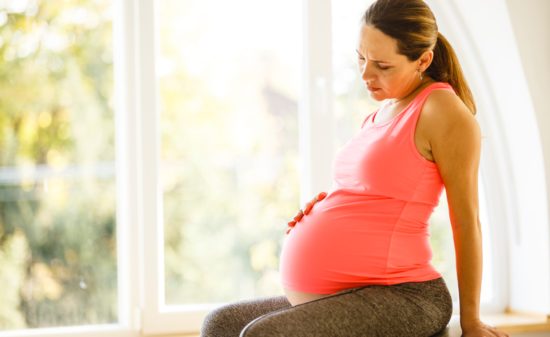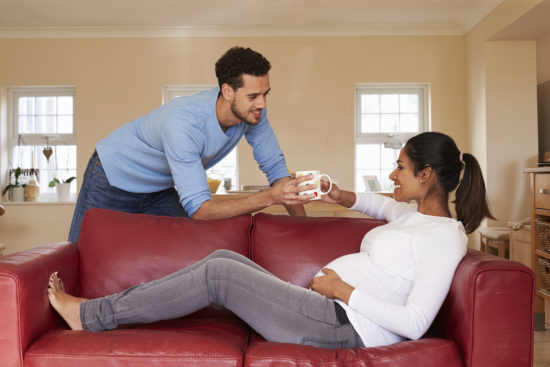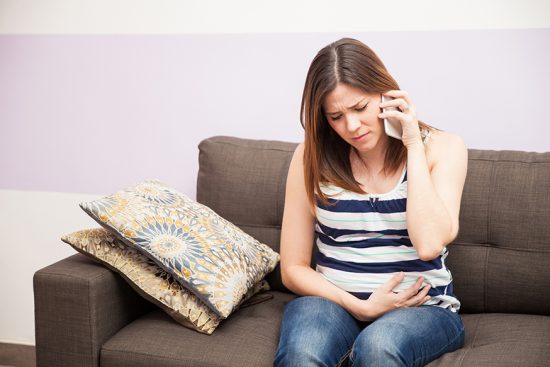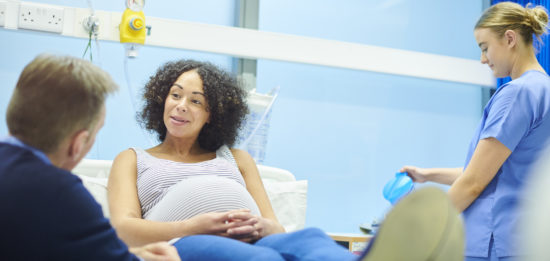You might already know about active labour but what happens before that? Here we explain the early signs of labour and when to call your midwife…

For up to a week before labour starts, you might notice that you’re feeling a bit different. This is because changes are taking place in your body as it prepares for birth. While they’re not reliable signs and they do vary between women, here’s what you might notice:
For up to a week before labour starts, you might be feeling a bit different
The NHS say that women could also experience:
It’s good to remember though that these symptoms could be related to the growing weight of your baby or a stomach upset.
You’ll probably be at home during this stage. It can help to take this opportunity to rest and nourish yourself with food that’ll sustain your energy. It’s also good to distract yourself with activities that you find fun and relaxing, such as having a bath or meeting a friend for a gentle stroll.
Your birth partner can help you too by offering support and encouragement.
It’s not known exactly what starts off labour but natural hormones (mainly oxytocin) in your body control your contractions. And your emotions and the external environment can influence your hormonal activity. So that means experiencing fear or stress makes you more likely have a labour that slows down or stops. This is why some women try using relaxation and breathing exercises.
Your baby’s actions, position and stage of maturity might also influence your progress towards labour.
Many women feel anxious about remaining at home. But there are benefits of doing so.
Women who spend less time on the labour ward, are less likely to receive syntocinon, they feel more in control and have less need for pain management drugs. A couple of studies say that women who stayed at home during their latent stage described a ‘sense of power’ that stayed with them throughout labour.

There is no universal agreement about when the latent stage of labour ends and established labour begins. The NHS suggests phoning your midwife for guidance if you experience the following signs:
Most women describe these contractions as very painful while others say they are intense or overwhelming.
For most women the early cramps and niggles will develop into stronger sensations. Some women say they’re like strong menstrual cramps that gradually become stronger, longer and closer together.
Some women say they’re like strong menstrual cramps that get stronger
There is no ‘normal’ path and you may have a very different experience to friends and family who have given birth.
While some women experience lots of sensations in the run up to active labour, others will have a quick onset. For this reason, early or latent labour is almost impossible to define. The definition of active labour is:
Your midwife will talk to you about how many contractions you are having. But there is no single definition of the point at which active labour begins. Your midwife will need to use their professional judgement as well as the local policy of the hospital or birth centre you are attending.
If you are choosing to go to hospital or a birth centre, your midwife may want to check you’re in active labour before you come in by talking to you on the phone. It’s possible your midwife might ask you to come to the hospital if they think active labour has started. In some areas, the midwife might visit at home first.
Whatever your experience of contractions, you’ll need to focus on them as you go from latent to active labour. You or your birth partner might notice that you start to switch off from the world around you while you use your coping techniques.
At this stage many women find they want to be quiet and appreciate a more peaceful relaxed environment around them. Holding a conversation becomes more difficult, especially during a contraction.
Because everyone is so different, it is important to listen to your body and your own unique experience of labour. Do ask your midwife if you’re unsure about anything or want more information.

If you’re less than 37 weeks pregnant, call your midwife if you’re having contractions and have:
These are signs that you may be going into premature labour.
After 37 weeks, call your doctor or midwife if:
From 36 weeks, it’s a good idea to get ready for labour and the next section discusses some things to keep in mind.
“As your due date approaches, your body is getting ready for the baby and so can you by packing your maternity bag from 36 weeks.”
Braxton Hicks contractions are caused by the tightening of your uterine (womb) muscles in preparation for labour. That’s why they’re called practice contractions and are usually painless.
Some women experience Braxton Hicks contractions as early as their second trimester. So they’re not an indicator of labour, more your uterus keeping itself fit and active.
Braxton Hicks contractions often become more noticeable at the end of pregnancy as the size of the uterus increases. You may be worried about confusing Braxton Hicks with labour itself.
When you’re entering early labour, your contractions will become more frequent, rhythmic, intense and longer, as the cervix starts to soften and open up (dilate). You can read more about the first stage of labour here. Braxton Hicks contractions usually stop after a period of time and don’t increase in intensity.
As your due date approaches, you will have lots on your mind so it’s a good idea to run through the following and make sure everything is ready:

If you have any doubts about whether your labour is starting, give your midwife a call.
The build up to your due date can be exciting, stressful and tiring. So try to relax as much as you can in the last few weeks of pregnancy. Once your baby arrives things will certainly get busier.
Your birth partner can help you in the last few weeks to get ready for the arrival of your baby, they could:
Most importantly, birth partners should try to be patient, calm and supportive. Listen to your partner – she’s the one who knows best what she needs and your support will be invaluable to her.
Our support line offers practical and emotional support with feeding your baby: 0300 330 0700.
We also offer antenatal courses which are a great way to find out more about pregnancy, labour and life with a new baby.